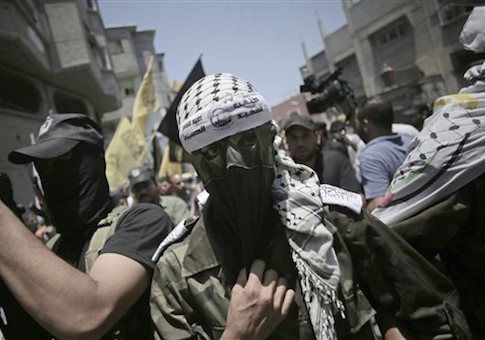The military wing for Fatah, the Palestinian political party that controls the West Bank, is calling on its supporters to expand the Intifada against Israel and suggesting that an Israeli official be assassinated as retribution for the death of Palestinian Authority minister Ziad Abu Ein last week.
Abu Ein died of a heart attack during an anti-Israel protest in the West Bank last Wednesday, although the Palestinian Authority claims the Israeli government assassinated him.
Fatah’s military wing, the Al-Aqsa Martyrs’ Brigades, issued a statement urging supporters to "respond in kind" to the "assassination," according to the watchdog group Palestinian Media Watch.
"We call on the Al-Aqsa Brigades in the West Bank to respond in kind to the cowardly assassination crime," said the statement.
PMW said the comment appeared to be a veiled call for the assassination of an Israeli minister, and should be taken seriously in light of prior revenge killings.
"These kinds of threats must be taken seriously," the watchdog group said on Monday. "When Israel killed terrorist leader Abu Ali Mustifa, head of the Popular Front for the Liberation of Palestine (PFLP) during the PA terror campaign in August of 2001, there were immediate calls for revenge."
"Two months later, Israeli Minister Rehavam Zeevi was murdered by the PFLP as he walked to a hotel room in Jerusalem," PMW added. "Ahmad Sa'adat, the leader of the PFLP who replaced Ali Mustafa and planned the killing, admitted it was a revenge murder."
Ma’an News Agency reported that the brigades also called on Palestinians to "expand the intifada and resistance everywhere" and praised Abu Ein as a martyr.
"Abu Ein died resisting; he was planting an olive tree on Palestinian land to protect it from being confiscated by Israel ... and to plant hope for coming generations," said the statement, according to Ma’an.
Abu Ein previously served time in Israeli prison for his involvement in a 1979 terrorist bombing that killed two Israeli teenagers. He was released in a prisoner swap, and went on to serve as a deputy minister of prisoner affairs in the West Bank.
Autopsy reports by both Israel and the Palestinian Authority found Abu Ein died of a heart attack during an anti-Israel demonstration. However, his supporters said the heart attack was caused by Israeli soldiers, who allegedly beat the Palestinian minister during the protest.
Israel’s Channel 10 News reported on Monday that the IDF was cleared of responsibility for the death after a Border Police investigation.
According to Arutz Sheva, the report also found that Abu Ein cursed at the IDF and rejected potentially life-saving medical help at the demonstration.
